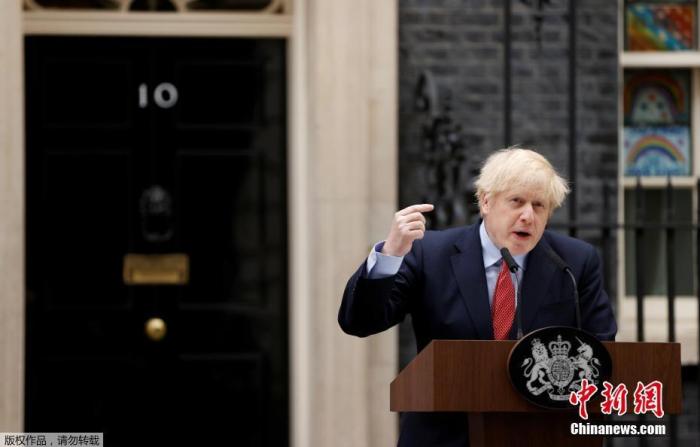China News Service, Beijing, July 6. According to the British "Guardian" report, British Health Minister Javid and Chancellor of the Exchequer Sunak announced their resignation on the 5th, and British Prime Minister Johnson subsequently announced their successors.
A number of British media said that there are various signs that Johnson's prime minister's career has been "on the brink".
Data map: British Prime Minister Boris Johnson delivers a speech at 10 Downing Street, London.
'Johnson must go'
The "Guardian" commented that Javid and Sunak's respective resignation letters have the same theme: Johnson must go.
Javid said in the letter that the British people expected the government to be "integrity" and "capable of acting in the national interest", but under Johnson's leadership the government failed to live up to the people's expectations, and he lost confidence in Johnson as a result.
Sunak said that the people want the government to work "properly, competently and seriously". "In my opinion, these standards are worth upholding, which is why I resigned."
According to the British "Financial Times" report, the two resigned on the same day that Alex Chalk, the Deputy Attorney General for England and Wales, announced his resignation, and some young Conservatives also announced their resignation in the government. .
On the evening of the 5th, Johnson appointed Barclay, Minister of the Duke of Lancaster and Minister of the Cabinet Office, to succeed Minister of Health and Minister of Education Zahavi to take over as Chancellor of the Exchequer.
"On the brink of desperation"
The news of the cabinet minister's resignation appeared on the front pages of several British newspapers, saying that Johnson's prime ministership appeared to be drawing to a close.
The Daily Telegraph said the departures of Javid and Sunak put Johnson "by a thread" and Johnson was struggling to prop up his cabinet.
Reports in The Guardian, The Times and the Financial Times have all described Johnson's situation as "on the brink".
The Daily Express interprets the news in a more positive way, reporting that Johnson, under pressure, refused to resign and quickly reshuffled his cabinet, which would allow his government to advance the "true Conservative agenda" and win the next general election.
unprecedented crisis
CNN commented that Johnson's Conservative government has fallen into an unprecedented crisis, and some of these crises have come from "scandals created by the prime minister himself."
For some time, the fermentation of the "Party Gate" incident has caused widespread doubts about Johnson in British public opinion, and the opposition and Conservative parties have also put a lot of pressure on Johnson to resign.
On June 6, Johnson survived a no-confidence vote against him in the Conservative Party to retain the prime minister and Conservative leadership positions.
Since then, Pincher, the deputy whip of the Conservative Party appointed by Johnson, was exposed to misconduct, and public opinion began to question why Johnson knew that Pincher had a problem with his character, but still gave him the appointment.
After Pincher announced his resignation on June 30, Johnson issued a public apology for appointing Pincher on July 5.
(Finish)

